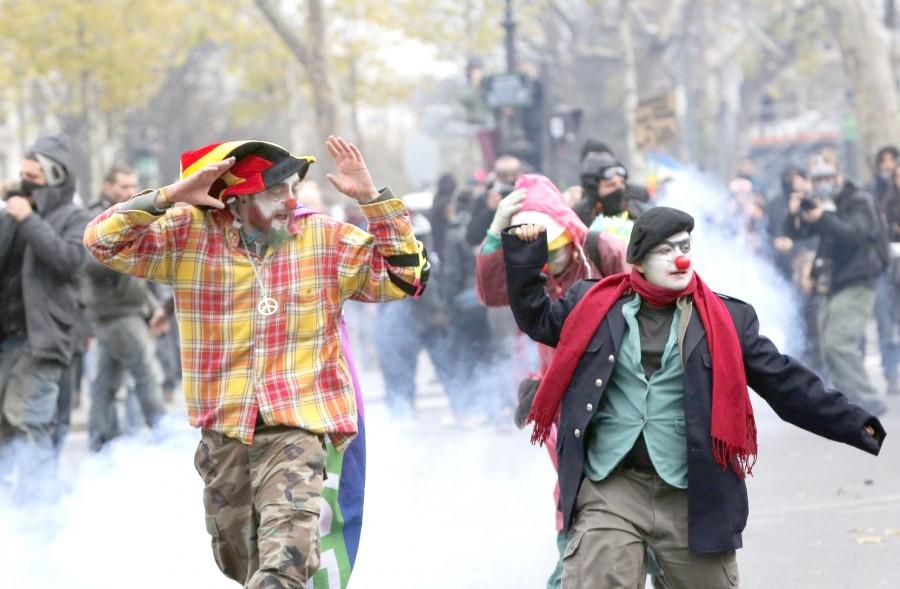Climate change: why it matters
December 2, 2015
In the upcoming week, many world leaders will meet in Paris, France to discuss the ever changing climate of our world. This sparked a protest where over 200 people gathered at the Place de la Republique in Paris, France, according to CNN, to voice their concerns on the climate of our world.
The rapid climate change in our world and what it means for us and future generations, otherwise known as climate change, has been referred to as “terrorism on ourselves” by many activists. The question being asked: is that to dramatic?
Yes, we are supposed to have freezing winters and hot summers, but not to the extremes seen in recent years.
Global warming, as defined by the U.S. National Resource Defence Council, is weather and its extreme highs and extreme lows in temperatures, heavy flooding and snowfall, and what it all adds up to. These extremes are not natural and not what should be happening to our world according to the World Wide Fund for Nature (WWF).
These extreme changes have been proven to come directly from humans according to the WWF and their research. The way we produce carbon dioxide, a greenhouse gas that comes from burning fossil fuels, is changing weather patterns. When we burn fossil fuels it creates greenhouse gases that rise up and are trapped, forcing the earth to warm up. These greenhouse gases also come from livestock, such as cows, when they release gas.
In 2014, the Chicagoland area had record lows of -52 degrees fahrenheit according to the Weather Channel archives, a number so low and chilling that the area basically stopped working for a two-day period. This is an example of global warming and what it’s doing to our earth.
These protesters make valid points. We, as a whole, need to start making changes in our everyday lives to help fix the problems in our environment instead of worsening them, such as recycling or riding the bus instead of driving. China’s smog levels have been lowering, but not enough. The gasses created by the U.S. have been decreased by trying to utilize new sources of energy. Still, this decrease is not enough.
The problem with making these changes is they require entire countries to change their way of life. Being able to convert 100 people into using electric vehicles with no need for oil is easy, but getting 100,000 people on board isn’t. Many people would have to change their life to do the “green” thing, so many don’t.
It also takes a lot of money to research and carry out new ways to do our daily activities, just in a more environmentally clean way. For example, putting solar panels on your house would take at least $5,000. It’s economically cheaper to keep using the old, less environmentally friendly, route of using natural gas to heat the house, not looking at long-term financials.
I’m not a scientist; I can’t tell you exactly what to do and what the changes will be like. I can’t tell you what will happen if you switch to an electric car versus a gas-fueled car and what impact it has on the environment. I can just tell you it’s the better solution. Not only do the rechargeable cars not need the fossil fuel that we spend billions a year digging for, but they also doesn’t emit the same type of harmful gasses into our atmosphere.
What I can tell you is that I’ve read a lot on the subject and can say that if we don’t start making changes to the way we live, we’re gonna have some major problems.
I think the route we’re on will keep going until one day something major, like the ozone layer opening wider and wider to the point that SPF 200 is a low level sunscreen. As of now, SPF 200 doesn’t exist, but at the rate our planet is going it might have to. All of the warning signs such as hurricanes and earthquakes don’t seem to scare enough people into believing that we need to make a change.
These naturally occurring disasters still happen without human influence, but they wouldn’t be happening at the rate that they are now or to the extent. Sure, we would still have snow, but there wouldn’t be snowfall in Georgia, a state that never gets snow. According to University of Arizona we are on the path to becoming a planet similar to Venus, who has extreme weather, extreme heat and is always cloudy.
I personally don’t want to have to put on SPF 200 on my grandchildren who are going out to play in the backyard. We need to fix these problems hurting our world instead of worsening them by continuing on the path we’re on. Yes, it will be hard, but the changes we will see will not only benefit us but our future children and grandchildren to come.


















